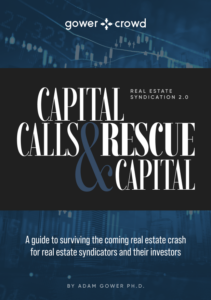Peter R. Fischer, Partner with Sklar Kirsh
Rent Relief, Mortgage Payments and What Happens When it All Comes Due
 Today's Guest Peter R. Fischer
Today's Guest Peter R. Fischer
On today’s episode I speak with real estate attorney Peter Fischer, partner at Sklar Kirsh in Los Angeles. I met Peter through a client of GowerCrowd and have had the pleasure of working with him on commercial real estate syndication issues.
In our conversation, we explore the ongoing coronavirus pandemic and its impact on the commercial real estate industry. What are the implications of rent deferment across the board? How does the current downturn compare to the 2008 housing crisis? Peter and I dive into these topics and more as we attempt to get our bearings in this rapidly changing climate.
What You're Going to Learn
- Communicating Properly with Your Tenants in Uncertain Times
- The Implications of Rent Deferment for Tenants and Landlords
- Applying the Force Majeure Clause During a Pandemic
- Comparing the 2008 Financial Crisis to the Coronavirus Pandemic
- Distressed Funds During Distressing Times
- Options for Buyers Currently in Escrow: Get Out or Make A Deal?
- Best and Worst Performing Commercial Real Estate Asset Classes
- Challenges Across the Board for Commercial Real Estate
- And much more!
Listen To or Watch the Full Podcast Here
Show Highlights
Applying the Force Majeure Clause During a Pandemic
Adam: But used the term force majeure. Force majeure. I think it's. Must be an Irish expression.
Peter: It's officially French for superior force.
Adam: So now this presumably is this is a term that is used in commercial leases, not in residential leases. I'm guessing. So tell me something about what this term means, exactly. Sure. And that and then let's talk about material adverse changes. Yes. Which is something we saw during the last time downturn. And what are the similarities between these two?
Peter: Yes. So, yeah, it's found in a lot of commercial leases, a lot of other commercial contracts then. And it's usually seldom used. Right. I mean, what it is, is, you know, if it's a flood, sometimes terrorism strikes or, you know, depending on the drafting, epidemics, pandemics. Right. And it is a force that is beyond the control of the parties that causes them not to be able to perform under the contract. Now, typically, it's found mainly, again, as you said, and leases sometimes and purchase and sale agreements, but not as much because they have casualty and condemnation and other provisions that are similar. But again, you know, in that sense, they would cover physical damage to a property which would excuse a purchase. But but usually. Right. Not something like this, which is when there's no physical damage, the property is still there. It's just, you know, a big effect on the economy and jobs and and people's lives. So that's sort of force majeure. It's you know, there's there's an event that occurs that is beyond the party's control, the contracting parties. That sort of excuse is the performance under the contract.
Adam: So whose benefits is that usually oriented to the tenant or the landlord or is it somehow?
Peter: It could be both. Usually it's in favor of the tenant or a lot of times you'll find it in construction contracts in favor of the party who's doing the development, the contracting and then paying for it. But it could be. It could go both ways. Right. I mean, imagine if you are a construction lender, you want to be continuing to put out draws of, you know, construction loans when you don't know what's happening in the market. So it could go both ways. But if it is, I think, most typically thought of in the case of like large commercial tenants who have the obligation to pay, you know, tens of thousands or hundreds of thousands of dollars and they are lease payments and suddenly, you know, they're forced to close and they just can't operate.
Adam: Ok, so I thought, yeah. So that is the tech, that is the clause in a contract that attempts to account for these kinds of circumstances. That's right. How is it actually being used? Are people saying, well, hey, look, I've got this clause. Therefore, I am not paying or you've alluded to this idea that people are being accommodative of each other because it's such an unusual circumstance. Yeah, more clauses being negotiated specifically as definitive direction for the how we're going to resolve this problem.
Peter: Well, it depends on the case. It depends on the document. Again, in leases. And it also depends on how the particular clause is drafted. You know, I think when you think of a force majeure clause, a lot of people who, you know, just put them into the contracts and they're boilerplate. They cover terrorism and floods and hurricanes. Most of them probably are not specifically tailored to pandemics and epidemics, although I can guarantee you that they will be now going forward. But, yes, so. So in particular, in leases, you know, as I said, even before this all started at getting right, tenants like, you know, restaurants and retailers were sending their landlord letters saying, you know, look, we we recognize this is nobody's fault. But if we are forced to shut down our operations, we are going to be calling on this clause. But let's figure out a way to work on this. Right. And courts have often said, you know, even if you're going to invoke these clauses, you have to be You have to put people on notice and you have to attempt to mitigate. So here, you know, maybe, yes, you can do if you're a restaurant. Again, you could do take out or, you know, make partial rent payments.
But if you're forced to shut your doors, there's not a whole lot that you can do unless you are, you know, a specific kind of restaurant and you have a large takeout type, you know, a business or something else. On the on the purchase side, the purchase and sale side, very much less clear cut. And, you know, we have a lot of buyers who are either trying to get out of their contracts if they're asked to continue to see period, you know, or maybe yet trying to get a price reduction or in some way use the concept of force majeure or, you know, in that sense. But typically, those kinds of agreements don't have force majeure clauses. They have condemnation or casualty. And so we're making, you know, lawyers like us are making all kinds of creative arguments like this is a temporary taking, you know, but it's it's harder because, you know, they haven't shut down your multi-family property, let's say. But maybe there are, you know, reps and warranties on how and this this is something that will come up on April 1st as well.
You know, deliverables of projections that you have told the buyer. Well, now you're going to really find out if those are holding true.
So if you haven't closed yet, you know, that may be something else. Or you get one line, you got one less look at the books. Right. You have a well-drafted purchase agreement that says your reps to remain on the closing date. You know, that potentially could be helpful. Or there's often conditions that from the period at the end of the contingency period through closing, the seller has to operate in the normal and ordinary course of business. We probably can't do that anymore. So that's another possibility. But again, it's this is uncharted waters for everybody. And these are the types of arguments that we're trying to make on behalf of our buyer clients. And of course, sellers are saying, well, no, you know, this this property is still available for you to buy.
You know, there's no specific force majeure or language. So it it goes back and forth.
FOR REAL ESTATE DEVELOPERS
THE WHITE BOARD WORKSHOP
Learn the exact system best of class sponsors use to raise money online.
Comparing the 2008 Financial Crisis to the Coronavirus Pandemic
Adam: So the tone that I saw being used a lot during the 2008 crisis.
And I remember it primarily on the bank side was this idea of material first change that really meant nothing when you rent, read through the contracts until there was a massive collapse in the system and then. Right. This this will work for that. Is not something that you see used. To a certain degree.
Peter: Yeah. But you're right again. Right. It's on the banks side. You know, a default, let's say for the bar or there's a material adverse change. And what does that mean? You know, in the last five to seven, you know, however many years when we've been on this incredible run for real estate, it's meant absolutely nothing. But again, as you said in 2008 and probably now, there's certainly changes that are material and adverse, you know, and they're often in the bank's favor or in the landlord's favor. And so those parties are certainly looking at those types of clauses. But again, they have to work with their borrowers or their tenants because, you know, the last thing that they want to do and as happened in 2008 when there were a whole bunch of foreclosures and banks didn't know how to operate these properties. And so I think, you know, I don't think banks are in the shape and lending like they were back in 2008. So I think that's another reason that it seems like along with the human element, you know, folks are trying to work together, you know, and stretch out the rent payments and put them on the back end or, you know, that kind of thing.
Adam: Right. And it's been a little bit more federal support as well of banks this time, hasn't it? Absolutely. They're not being arm twisted in to marking assets to market and recalibrating all, reappraising everything. And yet et cetera. I mean, Tell me something about that. Why t was a bit different from last year.
Peter: Yeah. And I think that a lot of that has to do with the fact that the banks are not in the shape. Right. That they were in 2008. This is this is not an environment where banks were just going crazy anyway. Banks were much tighter. You know, there's there's Fannie and Freddie, big agencies. You know, there's a lot more relief. There are some you know, we have some deals where where debt funds, you know, that are not bank specific. They have had difficulties. You know, they've run out of money or have a moratorium, especially until April 1st. Right. When we start seeing what's happening. But I think the banks generally have been in in better shape. They are looking to the federal government to have the support if they, in turn, are supportive of their tenants. So it doesn't seem like, at least from that aspect, where in the same kind of situation as 2008.
Options for Buyers Currently in Escrow: Get Out or Make A Deal?
Adam: So tell me, what are you seeing as somebody let's get back some of these questions that we did... Not to stay too off but not off topic, but on these fun questions that I'm interested in, in asking, one of the questions that we told you about was, what are you seeing if somebody is in escrow and their money's already gone hot. So you've already talked about you've touched on that. But to drill down, I know you've got a few points that you wanted to mention on that.
Peter: Yeah. So this is a really interesting situation. Right. I mean, we had sort of leading up to this. We got a client with four active deals going gung ho, two different lenders, you know, equity partners. Right. And this is obviously hit all of these participants. So we've seen everything from, you know, buyers and escrow, you know. And if they're not past their contingency period, I think most buyers are just now pulling out and waiting to see what happens. But once you've gone hard again, where, you know, making all these arguments, of force majeure, temporary taking, you know, common law provisions of, you know, impracticality, you know, frustration of purpose. So it's really become kind of a letter writing campaign and crafting arguments to figure out how you can. And not all buyers might want to get out. Some want a price reduction. You know, some want to extend the escrow period 60 or 90 days. And and absolutely, again, it depends on the asset class. I think you won't find any buyers who were going into a hotel deal who want to do anything but just get out of the deal, whereas on the multi-family side or self-storage or, you know, in other asset classes we deal with, that's not the case.
You know, in some of these deals, the banks are the ones who are coming in. Banks or or, you know, debt funds, lenders are coming in and retrading, you know, upping the interest rate, you know, demanding more, longer interest reserves.
So that in then affects the borrower and how they need to react.
You know, and the seller also maybe the seller is in a 1031 exchange. So. So these are all different permutations of things that we're seeing. But certainly there is anything from. Help me get out of escrow to we need 90 additional days or a price reduction or any combination of those.
Adam: It's interesting that you say that banks are the ones that you're finding a retrading, particularly as interest rates are historically almost, not quite, as low as they can possibly go. You would think actually that this was a very good time to borrow. Tell me what that's all about, trying to get out of these deals by doing that. Or are they profiteering?
Peter: No. I mean, I think the banks are skittish like anybody else. And you know that the banks are pricing the risk into the market. And the first thing they would do is put in a floor on Libor so that doesn't run away. But then, you know, they would use all of these same arguments to say, look, you know, your interest rate was at three something. But in order for us to do this deal like this does happen to us, the banks went up to 5 percent. So and, you know, this is a non-agency bank. You know, not a Fannie or Freddie deal. And again, it's also very much happening with the non-bank lenders, like the debt funds who are running out of money. That's interesting.
Adam: Yeah, Peter, but it's interesting that you say that because it seems to me that either the situation is so dire that you don't want to do the deal. Right. Let's just stop and wait. But to increase the price. Is it's a different approach. Are you measuring? Are you building risk into it because is that's what is not what's happening. I mean, it's taking a larger spread or is it? We're trying to. We're going to try and put this so out of reach that you back out. We really don't want to do this, but we're not gonna say that.
Peter: No, I don't think so. I mean, we certainly have had lenders. And actually one of the deals, two of the deals have the same equity partner. And the equity partner did just say, you know, we're out. We can't we don't know what's going to happen. We're just taking parts. I do think from the bank side, you know, unless you're one of these debt funds, who's out of money or something? I do think it's about risk.
And I think the banks, at least so far from what I've seen, they want to do the deals and there is still liquidity, but it's, you know, a slightly different profile right now.
FOR REAL ESTATE DEVELOPERS
THE WHITE BOARD WORKSHOP
Learn the exact system best of class sponsors use to raise money online.
Best and Worst Performing Commercial Real Estate Asset Classes
Adam: What asset classes I'm interested to know are holding up better. If you mean a skipping a kind of a best to worst and any surprises?
Peter: Well, the worst, obviously, is retail and hospitality. One surprise has been, so I'm working on I do a ton of residential, but I'm working on one very high end single family. Actually, it's a two parcel property in Beverly Hills. And that deal has had that same type of issues from our side of the equity partners backing out. Is that the other thing where so far working with the seller. But we've been able to present the seller with some good news that seven homes in the last 10 days have been closed in the, call it, twenty five to forty five million dollar range in that area, which is very surprising. Right. I mean, there were no face to face listings. Right. You know, you can't go to property tours, but I think a lot of very wealthy folks want in. You know, they want a sanctuary. And so there's actually sales of single family homes that particularly, I think, high end homes that are doing all right and reasonably well.
And frankly, in the back end of this, I think, you know, there may be a flights out of density, you know, people who want a little bit more space.
And and so I think the residential, particularly high end residential market probably will be OK at the end of this. You know, I think self-storage, you know, other other types of facets where there's not a lot of face to face. The rents in storage are not that high. A lot of them are on auto pay. Right. So it may be a while or people who lose their jobs and have to save money realize, hey, you know, this is getting withdrawn automatically from my account. Whereas high traffic, you know, high touch hospitality, retail, all these other asset classes, I think are going to be really devastated.
Adam: What about multi-family lease-up rates? I've heard anecdotally that there are spikes actually in that. Is that something you've seen anywhere?
Peter: We have had reports on, you know, with one client of the lease-up, rates going up. But I think come April, we'll actually see, you know, what happens. And look, people need a place to live, even if they've lost their jobs, which is, you know, the one of our clients is big mobile home park operator.
And they think that they'll be in fairly good shape.
But at the end of the day, you know, if if the job report was, what, 3.3 million unemployment, twice what people thought it would be, and it's it's not going to get better maybe before it gets worse. So I do think that even in these residential type multifamily loans, they'll be. You know, issues there as well.
Adam: So one of the comments that you made in your e-mail to me was that buyers and sellers, real estate investors are optimistic. And nobody's really acting as though this is, quote, "the end." The music has not stopped... It stopped, but it's just on pause. We're just waiting for it to come back. That's really how people acting, you think?
Peter: Yeah. Well, I mean, if you look at the public markets, write down, what, thirty five percent in two and a half, three weeks.
That's not happening in real estate and private deals. I mean, in pricing. Right. I mean, it's you know, properties have not declined by thirty five percent. Now, right now, it is very difficult to get a deal done. But it is not the case where there is. And I think this is, again, a difference, at least at the moment with 2008.
There is not massive amounts of single family homes that are, you know, in Vegas or wherever that are 30 percent, 50 percent off of the price that they were previously. And, you know, I I do think like we're getting some calls for distressed debt or distressed funds to be formed. But, you know, there is not this mandate and I don't think rush to sell. Right? If sellers on pause and their properties are down 10 percent. I do think that people think in another six months or another two quarters, prices and deals will come back. It's not like people's properties are down. Portfolios are down 50 percent on the private real estate side. So far, I don't I haven't seen that.
Adam: It's just made a five year deal into a five year and six month deal.
Peter: Yes. And maybe a six year. You know, we'll see.
But but so far, I mean, the prices have not plummeted like they have. You know, there's no crazy bargains like in a public equity market.
Adam: Yeah. Other than REITs, maybe. That's right.
Peter: But what I mean, in in, you know, individual private real estate assets, I don't think, you know, these the multifamily properties and the mobile home parks and self-storage facilities.
We've not seen anybody saying, wow, this is, you know, other than the buyers writing or trying to figure out what to do in escrow. You know, again, look, lots of people in the last five to seven how ever many years have made lots of money and they have it and they need to deploy it. You know, we had another call, a partner of mine with with a client who has two funds of six hundred and eight hundred million dollars.
And they are thinking, hey, got all this dry powder. You know, it's going to come to pass in three, six, eight months that there's going to be assets to buy.
No, I don't think people are thinking it's the end. I think people are, again, hitting pause and and trying to make sense of everything and seeing what stimulus comes and what regulations come down. But it'll be there will be a time when, you know, there's there's deals to be done again.
Adam: Interesting. Yes, it is. It is a different feel from the last time. Isn't it. Very much so. Yeah. Into the abyss of financial collapse. This is seems to have it's so unnatural that it seems more like a bump. Obviously a really tough bump, but bump nevertheless in the road. And we're still headed in the right direction.
Peter: I think that's right, and I think, you know, the last time when the banks were lending, you know, I mean, it was real estate related or real estate cause. Right. I mean, this this is not that. So I think the real estate markets, the banks and the players generally are in better shape going into this than they were in 2008.
Adam: So you did mention opportunistic deals. Let's just wrap up with a couple of questions. Folk folk are looking at putting together distressed deals with distressed deal funds in anticipation of some failures. Right.
Peter: That is. Yeah, that is correct. We do have clients who have called about that.
So what what are you anticipating are going to be the areas that will yield those kinds of opportunities specifically?
Yeah. I mean, I would be surprised if people come out of this and want to jump back into retail and hospitality.
I mean, obviously, there will be access. You know, I think a big decline there.
But if you think about it, when it's safe to go back to work or people immediately, you're going to want to go back to a crowded restaurant or, you know, a concert or a basketball game. So I think I think maybe some folks will be looking at those kinds of assets. But I think probably more in the office or if there is, you know, the mom and pops who have been forced to sell their multi-family, it's you know, it's hard to say. I think a big area where there will be some opportunity is in the restructuring funds or, you know, sort of the bridge loan kind of thing where there will be a period where. Right. Restaurant owners and these people will need to restructure and need some help getting back on their feet, but eventually will recover. So it'll be interesting to see whether it's actually buying assets or on the lending side of, you know, lending support to some of these other industries.
Challenges Across the Board for Commercial Real Estate
Adam: Well, it's going to be the hardest challenge that a multi-family operator is likely to face. And how should they handle that? And then let's ask the same question about office. I imagine it's the same, but maybe some nuances.
Yeah, I mean, not you know, any of it is dependent on location and depending on sort of asset class.
Right. I mean, working class renters vs., you know, folks like me who are, you know, in a Beverly Hills condo.
But the hardest thing is going to be suddenly when all of these defaults and all of these, you know, people start calling and then you have in your other ear, you know, the bank, your lender's calling you. And in the meantime, you're pulling out your leases and your loan documents and trying to figure out, you know, where am I going to be a default with my lender?
What do my leases say? How am I going to work out this situation when suddenly 25, 30 percent of my tenants are calling me, saying, I've lost my job, I can't pay the rent. And as far as what you should do, you know, again, we've already put this into play and been in touch with your lender and get in touch with your tenants, because that's really, again, the communication and putting these processes and sort of filtering out, you know, who can pay, you know, and communicating.
I think, again, on a human level with your tenants and saying, you know, look, we are here for you, we're going to offer you assistance, but only if you need it. Right. And then also going through your loan documents with your lawyers and your advisers and seeing, you know, what are my, what are the ramifications that I really do have 25 or 30 percent of my tenants do default. And let me preemptively contact my lender and start having that dialogue. And I think it is right, it's the same on the office side, you know, whereas people like my firm. Let's say we're all working remotely.
We have business interruption insurance, whether or not, you know, that the insurance companies accept a claim or not. You know, but at the end of the day, most likely there will be some nationwide or statewide litigation where some of these claims start to get paid and maybe some renters on the multi-family side have renter's insurance. But I don't think those policies are bound to cover for something like this.
So while, you know, some office tenants, law firms, you know, big financial firms probably are more likely to be somewhat operational and weather a storm.
You know, I still think there's going to be at least some percentage of those folks who are doing the same as, you know, multifamily tenants.
Adam: Yeah. Peter, a lot of brain damage, a lot of hard work and stress still to work through. There's no doubt about that.
Peter: I think it's closer to the beginning, unfortunately, than at the end.
But again, hopefully people are still willing to work together and, you know, have these conversations and work out the kinks.
FOR REAL ESTATE DEVELOPERS
THE WHITE BOARD WORKSHOP
Learn the exact system best of class sponsors use to raise money online.
Related to this episode:
A guide for remote workers
How to Setup a TV Studio Quality Home Office















